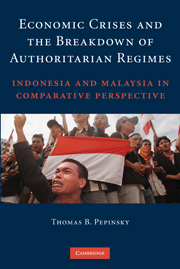 Economic Crises and the Breakdown of Authoritarian Regimes
Economic Crises and the Breakdown of Authoritarian Regimes Published online by Cambridge University Press: 21 January 2010
Malaysia's authoritarian regime survived the severe economic crisis that brought down Indonesia's New Order. Mahathir Mohamad retained firm control over Malaysia's political machine throughout Malaysia's crisis, even as contestation over Malaysia's political future rocked Malaysian society. In addition to implementing Malaysia's controversial capital controls and ringgit peg, Mahathir oversaw the arrest and conviction of his erstwhile deputy Anwar Ibrahim, as well as the regime's clampdown on a Malaysian reformasi movement. By December 1999 the BN had won its seventh election since 1969, easily retaining a two-thirds majority in the Dewan Rakyat (DR). Economic recovery through 1999 and 2000 reaffirmed UMNO's position at the top of Malaysia's political hierarchy. With the loyal and famously clean deputy prime minister Abdullah Ahmad Badawi prepared to succeed Mahathir on Mahathir's own terms, the stability of Malaysia's authoritarian regime was assured.
There are many existing explanations for the Malaysian regime's ability to withstand pressure for democratization. In this chapter, I argue that this political stability is the product of the regime's adjustment policies, which fulfilled the demands of each of its political supporters, poor Malays and the new Malay business class. Capital controls enabled expansionary policies, fulfilling the demands of fixed capital and the Malay masses. The effect of this radical adjustment measure for Malaysia's political opposition was striking. Having received their preferred adjustment policies, the regime's coalition of supporters had no incentive to withdraw support. So Malaysia's regime survived the crisis, despite the BN's most significant political challenge since the racial riots of 1969.
To save this book to your Kindle, first ensure no-reply@cambridge.org is added to your Approved Personal Document E-mail List under your Personal Document Settings on the Manage Your Content and Devices page of your Amazon account. Then enter the ‘name’ part of your Kindle email address below. Find out more about saving to your Kindle.
Note you can select to save to either the @free.kindle.com or @kindle.com variations. ‘@free.kindle.com’ emails are free but can only be saved to your device when it is connected to wi-fi. ‘@kindle.com’ emails can be delivered even when you are not connected to wi-fi, but note that service fees apply.
Find out more about the Kindle Personal Document Service.
To save content items to your account, please confirm that you agree to abide by our usage policies. If this is the first time you use this feature, you will be asked to authorise Cambridge Core to connect with your account. Find out more about saving content to Dropbox.
To save content items to your account, please confirm that you agree to abide by our usage policies. If this is the first time you use this feature, you will be asked to authorise Cambridge Core to connect with your account. Find out more about saving content to Google Drive.